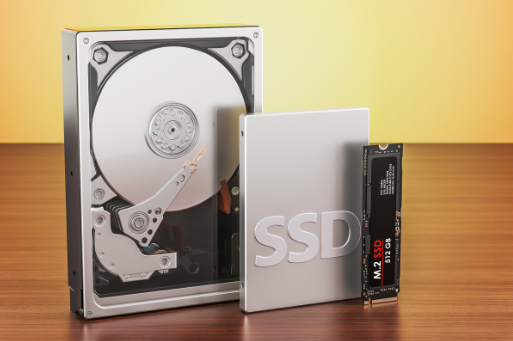Best Linux laptops in comparison
Your perfect Linux laptop: Lenovo or HP – together we'll find it! Imagine opening the box of your new laptop, excited to install Linux on it. Pe...

External hard drives are a great way to create additional storage for files, media, and other content on your computer or laptop . However, when choosing an external hard drive, you'll need to choose between an SSD (solid state drive) and an HDD (hard disk drive). Both options have advantages and disadvantages that you should consider before making a decision.
First, it's important to understand that SSDs and HDDs work differently and have different advantages and disadvantages. HDDs store data on rotating disks, which are read/write heads. SSDs, on the other hand, store data in flash memory chips, similar to USB flash drives. Below is an overview of the advantages and disadvantages of SSDs and HDDs:

When it comes to the advantages of SSDs, speed is a major factor. SSDs have faster read and write speeds than HDDs, meaning they can load data faster. This also means programs and games can start and run faster. SSDs are also more shock-resistant than HDDs because they have no moving parts. This makes them ideal for use on the go or in harsh environments.
Another advantage of SSDs is the lower risk of data loss. Since they have no moving parts, the likelihood of mechanical problems is lower. This also means they are quieter than HDDs. SSDs are also more energy-efficient than HDDs, requiring less power to run.
However, some disadvantages of SSDs are that they are more expensive than HDDs and have smaller capacities. If you need a large amount of storage space, an SSD can be expensive. It's also important to note that SSDs can slow down over time as they fill up. For this reason, it's important to choose an SSD with sufficient capacity to cover future storage needs.
HDDs still have several advantages over SSDs. One of the biggest is capacity. Today, HDDs can offer up to 18 TB of storage, while the largest SSDs typically have up to 4 TB. HDDs are also cheaper than SSDs, offering more storage per dollar.
Another strength of HDDs is their resistance to high temperatures. While SSDs can be damaged more quickly in high temperatures, HDDs are generally better able to handle higher temperatures. This makes HDDs a good choice for environments where high temperatures can occur, such as server rooms.
HDDs also have a longer lifespan than SSDs. While SSDs can lose performance over time due to their limited number of write and read cycles, HDDs are generally more durable. So, if you need an external hard drive that will last a long time and can store large amounts of data, an HDD is a good choice.
However, it's important to note that HDDs are more sensitive to shock and vibration due to their moving parts. If you frequently transport your hard drive or use it in an environment where vibration is likely, an SSD may be a better choice.
The cost of external hard drives can vary depending on capacity, brand, and type. SSDs are generally more expensive than HDDs. A 1 TB external SSD can cost between €100 and €200, while an external HDD with the same capacity can cost between €50 and €100.
If you need a lot of storage space, an external HDD may be a more cost-effective option. A 4 TB HDD can cost between €100 and €150, while an external SSD with the same capacity can cost between €400 and €500.
It's important to consider your storage and speed needs to make an informed decision. If you have limited storage and are willing to pay more for a faster hard drive, an external SSD may be a better choice. However, if you need a lot of storage and want a cost-effective option, an external HDD may be the best choice.
Our examples of good used PCs with SSD hard drives from various manufacturers:
Ultimately, the choice between an external SSD and HDD depends on your individual needs. If you need a fast, shock-resistant, and energy-efficient hard drive and are willing to pay more, an external SSD may be the better choice. However, if you need a lot of storage space and want a cost-effective option, an external HDD may be the best choice.
Regardless of which option you choose, it is important to back up your data regularly to avoid data loss.